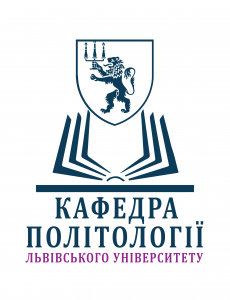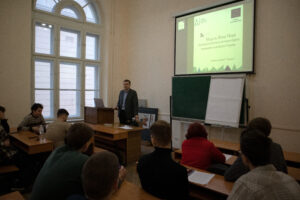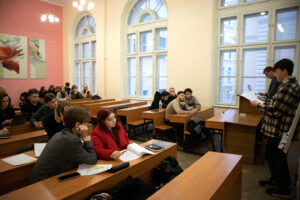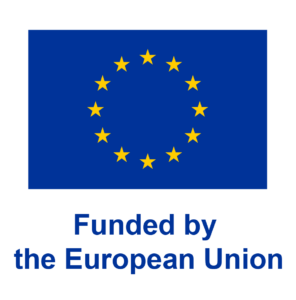🏆 Liberal democratic countries – to be!
📢 On December 6, 2023, the Department of Political Science held a team student game “Let’s create a liberal democracy together” within the Jean Monnet Module “Political Institutions and Systems in Europe: Comparison and Experience for Ukraine” under the Erasmus+ program.
👥The purpose of this activity was to improve and consolidate study skills. Students had the opportunity to re-analyze and deepen their knowledge of governance systems, inter-institutional relations and modes of functioning of political power. Also, each member of the student teams had the opportunity to practice public speaking and deliver their messages to the audience.
🎲 Three teams took part in the game – representatives of the fourth year of the bachelor’s degree and the first year of the master’s degree of the Department of Political Science. Before that, all participants of the game had the opportunity to take academic courses on comparative political science (in particular, on the countries of Western and Central Eastern Europe) authored by professors Anatoliy Romanyuk and Vitaly Lytvyn as part of the Jean Monnet Module. Based on the knowledge gained in these disciplines, the players had to present the organization of the institutional design, political process and structure of their newly created states, depending on the conditions that fell to them according to the lottery.
🧩 Teams A, B, and C were divided as follows: a federal centralized presidential republic, a federal decentralized republic with a semi-presidential system of government, and a unitary decentralized parliamentary republic. All these states, according to the legend, were previously undemocratic or belonged to other autocratic state formations, and now they faced the opportunity and task of constitutional/institutional engineering and democratization, which actually had to be designed by the teams depending on the initial conditions and final goals. And the ultimate goals are the achievement of sustainable democratic development, as a result of which the door will or will not be opened for the state to join a prestigious international or supranational organization similar to the EU.
✅ First of all, the students had to indicate to the expert jury, public listeners and all visitors of the game the parameters of their state – area, population, ethnic composition, neighboring states, etc., which actually became the determining background for the further work of the state-makers and “founding fathers”. After that, each team in turn presented the parameters of their state regarding the consideration and development of such criteria as inter-institutional relations in the triangle “head of state – government – parliament”, the powers of political institutions and their relations with each other, party-electoral issues regarding the functioning of parties and the development of an appropriate electoral system, the role of civil society, local politics and ordinary citizens in the course of the democratization of social and political life, etc. It ended with questions to the teams from the audience, the professional jury and everyone else.
🌐 According to the results of the game, some mistakes of each of the teams were analyzed, and successful moments of adapting institutional and political conditions to the parameters of the development of certain states formed as a result of the draw were pointed out. It was extremely interesting, there was a competitive atmosphere! All those present came to the conclusion that it is extremely important to pay attention to the balance of power within the framework of inter-institutional relations in the “head of state-government-parliament” triangle. However, expert judges also recommended that players pay more attention to the phenomenon of liberal democracy, because its difference from electoral democracy is significant.
The student team game was prepared and organized by the Department of Political Science, the Center for Political Studies and the student society “Polis” with the financial support of the European Union as part of the “Erasmus+ Program” under the direction “Jean Monet for Higher Education” (Module “Political Institutions and Systems in Europe: comparison and experience for Ukraine”, No. 101126702)










